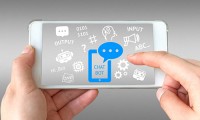-
NHS launches online care plan to empower end of life patients
- Source: Digital Health Age
- 1,039
- January 31, 2018
-
Remote patient monitoring startup LindaCare lands $8.6M from Phillips
- Source: MobiHealthNews
- 861
- January 26, 2018
-
Can digital tools really change patient behavior?
- Source: MM&M
- 1,131
- January 24, 2018
-
Digital currency-based fitness app Sweatcoin lands $5.7M in funding
- Source: Mobile Health News
- 1,038
- January 23, 2018
-
The Top 8 Technologies Combating Food Allergy
- Source: Medical Futurist
- 1,173
- January 22, 2018
-
AI funding tops $1 billion mark as mobile investments wane
- Source: Healthcare IT News
- 1,020
- January 19, 2018
-
This Company’s AI-Fueled Tech Is About to Bring Digital Health Care to Millions
- Source: Fortune
- 624
- January 18, 2018
-
Study shows wearables lack clinical impact, but researchers haven’t lost hope
- Source: FierceHealthcare
- 916
- January 18, 2018
-
How doctors and bots can work together
- Source: Venturebeat
- 780
- January 10, 2018
your submission has already been received.
OK
Subscribe
Please enter a valid Email address!
Submit
The most relevant industry news & insight will be sent to you every two weeks.













